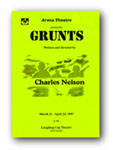

Badpuppy Gay Today |
Monday, 21 April, 1997 |

This play, a dramatization of Charles Nelson's gay classic novel "The Boy Who Picked the Bullets Up," premiered recently in Minneapolis at the Laughing Cup Theatre.
The play was written and directed by Charles Nelson.
The production, being done on a primitive stage with a "set" which consists of ammo boxes, trunks, a backdrop painted to look like a camouflage sheet and some chairs, tables and raised cots, is able to represent the denuded world that faced the characters in Vietnam during the war-period denoted by the novel's letters (which give both place and date: 2 August, 1966 to 21 July, 1967.)
A cast of eight, doubling, then tripling, plays all the characters.
The play has incidents from the novel and its sequel "Panthers in the Skins of Men" but the many many scenes of sin-and-skin from the two novels are alluded to, not illustrated. There are two occasions when a dude takes off a tee-shirt and the hero does lift the wraps off many a helpless (male) patient but the audience sees only the raised sheet.
The novel, as the many who read it know, is in the form of letters-home from the hero, Kurt Storm. The letters to his gay friend, Paul, give a graphic account of his very active sex-life and sex-specialty, getting it on with dudes who consider themselves straight.
For this production Charles Nelson has chosen to have the central character, whose name is now "Terry", played by a woman, Kari Ann Shiff, spending a good one-third of the play either facing the audience to have them share in her delight in her conquests or in her discomfiture with the facts of Marine life in Vietnam. She regularly commiserates with her sister-spirit, "Ray" (impersonated by Dan Douthit), who is seen talking to him/her, him/her's alter ego, and sometimes being a member of the Marine company, camping it up and carping about the discomforts of Marine-life-in-Vietnam.
Ms. Shiff is good at what she is doing and this viewer, faced with the task of watching an actress cast as a male, found himself able to imagine her as manly. But the personage that emerges is not the Kurt Storm of the novel, who is a big, macho former football player, but something closer to "Miss Thing", the thin, pomaded, blond-and-choiffed cartoon character in the old L.A. Advocate, a flirty queen who "got" beefy straight dudes.
The play then follows the hero through his tour of duty and dalliances and his dialogues with his alter-ego (not heard by the surrounding characters).
Viewers of this adaptation of the novel will have to adjust not only to a woman playing the male-lead but to another type of gay male than Kurt, one who camps a lot, thinks sex's end is sucking cock (the Kurt in the novel is both catcher and pitcher--the novel contains much rear traffic) and lives in fear that All Will Be Lost if the straights Find Out.
The play ends with the straights finding out, raping Kurt's new lover (the lover is later killed in war-action) and, at the play's end, turning on him, as he calls for a mother who is absent/present.
In the novel his mother dies mid-book (cancer) and he ends his tour of duty being shipped stateside after sustaining a wound.
Using five men (Brian Bennett, Michael Damon, Jared Reise, David Storlie, Mike Taylor) playing triple roles (and more than triple roles for some) with no change in appearance, costume or make-up, results in some confusion for the audience. This viewer was unable to tell if the character who seemed to be open and humorous about a same-sex encounter with the "hero" was the same person who later turned homophobic and led the company to attack "him/Terry" or--if this was one actor playing two different parts.
Easier to spot were the "Dinger" character (red hair/big grin)--played by Jared Reise--and "Kenny" (David Storlie) the only cast member who wore glasses.
The situations described were mostly very unpleasant and almost all those with women (his mother, the nurses, "Hanoi Hazel" (read Hanoi Jane Fonda)---are played by one woman, Jennifer Dodgson, all with the same voice, the same facial expression, all seen negatively, something not done in the novel. The singular female part not played by a woman was a dude dressed in a wig playing a Vietnamese whore who seemed more a college Varsity show character.
What we have in this play is the author's vision of a gay personage, making his way through the discomforts of a stupid war, a company made up almost entirely of stupid men, stumbling through a world of violence and boredom, relieved only by a few good dicks, accompanied by a very vocal campy alter-ego who feels the War is No Way to Treat a Lady.
The success of this production hangs mostly on the playgoer's acceptance of the person of "Terry", who, as written by Charles Nelson and played by Ms. Shiff, is a Queen (with Jester) in a Very Special Kingdom.
© 1997 BEI;
All Rights Reserved. |